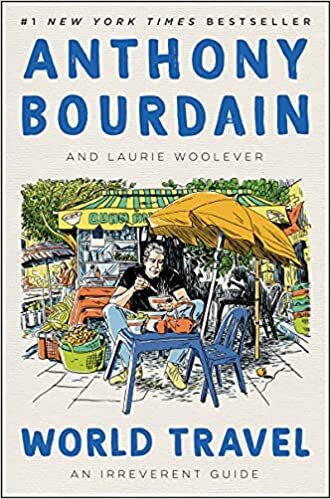World Travel: An Irreverent Guide by Anthony Bourdain and Laurie Woolever
Conceived by Anthony Bourdain and completed by his longtime co-author and assistant, Laurie Woolever, World Travel: An Irreverent Guide takes us around the globe one last time with Bourdain’s signature wisdom, humor, and open-hearted curiosity.
THE PREMISE: When Anthony Bourdain suggested working on a travel guide together, Woolever wondered if the world really needed another one. He finally convinced her, but the two met just once to discuss details. After the outpouring of sympathy and love when Bourdain took his life, Woolever resolved to carry on her friend’s wishes. “Maybe the world could use another travel guide, full of Tony’s acid wit and thoughtful observations and a few sly revelations of the mysterious contours of his battered heart, stitched together from all the brilliant and hilarious things he’d said and written about the world as he saw it,” she writes. The result is a comprehensive guide to many of Bourdain’s favorite places, complete with hotel and restaurant recommendations, written in Woolever’s words—and in Bourdain’s—mainly from his television shows, No Reservations, The Layover, and Parts Unknown. As promised, we get Bourdain’s irreverent voice and uncensored opinions. So expect to raise your eyebrows from time to time. For me, his use of terms like “boner” and “hard on” seem a bit too old-boys-network for the current times, but they channel the true Tony Bourdain.
Interspersed are guest essays from people they met in their travels, which is befitting for Bourdain, whose greatest gift was less his charm or audacity, and more his compassion for others and their stories. We also hear from Bourdain’s brother, Christopher, and his production manager, Nari Kye, who credits Bourdain with giving her a new appreciation of her Korean heritage. For instance, in the South Korea episode of No Reservations, Kye and Bourdain met her grandfather at the DMZ. She heard stories from his life that she’d never known before, including his escape from North Korea and the year it took to reunite with her grandmother. She writes, “I knew then, hearing this story, making this show, would change me. Back in New York, watching the edit come together, I thought, ‘This is the greatest thing I've ever done.’ And I was so grateful to Tony for allowing me to do it. He had no idea—or maybe he did—that he was changing my life, with this one episode of the show.”
THE SETTING: They cover 43 countries, in alphabetical order from Argentina to Finland to Mozambique to Vietnam. In addition to Nari Kye’s essay on South Korea, two standout chapters are on Laos and Uruguay, which Woolever says were of special interest to Bourdain because of his fascination with covert US operations in those countries. A large chunk of the book is also dedicated to United States travel, which may come in handy for Americans easing back into travel after taking a pandemic-induced break. Chicago, Austin, and Pittsburgh have never looked so good to me!
Despite Bourdain's sensitive worldliness, the book isn't without its problems: I spent my formative years living in Hong Kong, and was frustrated with the classification of Hong Kong as part of China while Macau was treated as its own destination. I sincerely doubt Woolever or her editors were trying to make a political statement with that choice, but it’s especially confounding right now while Hong Kong has been fighting to retain the autonomy it was promised and Macau has been appeasing China.
Throughout the book, Woolever masterfully weaves Bourdain’s stories together with practical tips like airport arrival and transportation information and timely updates regarding geo-political conflicts and COVID-19. Readers should know that despite the accessible tone of Bourdain’s shows, many of the recommended hotels cost top dollar, like a number of Aman resorts, which cost upwards of $900 a night. The book is no ode to luxury modes of travel, however. Woolever also tackles tough questions about the impacts of travel, like who are travel dollars really benefiting? For instance, in Tanzania, Bourdain observes the game parks, and the white travelers who pay tens of thousands of dollars to go on safari. He wonders if the game parks are for the locals, animals, or white tourists. He answers, “It’s an uncomfortable question. One would have to be truly monstrous to suggest that one be sacrificed for the other. But the slow grind of history is already making that decision for us—and the outcome is often not pretty.”
IN THE END: World Travel: An Irreverent Guide is an inspiring journey around the globe, particularly as we hope for an end to pandemic lockdowns, but it’s not a definitive book on travel, nor one that has all the answers about responsible tourism. At the very least, the book provides a reminder of Bourdain's determination to honor a traveler's most valuable trait, one we should all strive for: curiosity.
This post contains affiliate links to Bookshop.org. This means if you make a purchase from our link, Undomesticated will receive a small commission to help us fund more stories. We do not accept compensation for reviews. All recommendations and opinions are our own.










